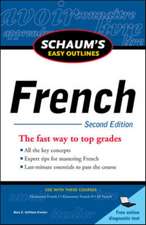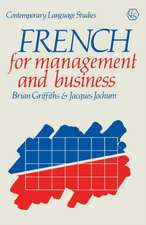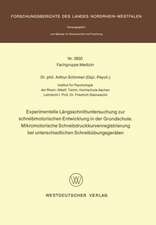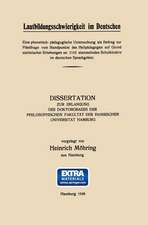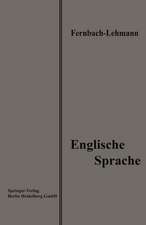Schaum's Outline of French Grammar, Seventh Edition
Autor Mary Crockeren Limba Engleză Paperback – 11 oct 2018
Fortunately, there’s Schaum’s.
More than 40 million students have trusted Schaum’s to help them succeed in the classroom and on exams. Schaum’s is the key to faster learning and higher grades in every subject. Each Outline presents all the essential course information in an easy-to-follow, topic-by-topic format. You also get hundreds of examples, sovled problems, and practice exercises to test your skills.
This Schaum’s Outline gives you:
• Hundreds of practice problems with step-by-step solutions to reinforce knowledge
• New appendix on punctuation
• Support for all major textbooks for courses in French Grammar
• Access to revised Schaums.com website with access to over 100 online audio recordings and more.
Schaum’s reinforces the main concepts required in your course and offers hundreds of practice questions to help you suceed. Use Schaum’s to shorten your study time-and get your best test scores!
Schaum’s Outlines – Problem solved.
Preț: 98.21 lei
Nou
Puncte Express: 147
Preț estimativ în valută:
18.79€ • 19.62$ • 15.52£
18.79€ • 19.62$ • 15.52£
Carte disponibilă
Livrare economică 25 martie-08 aprilie
Livrare express 08-14 martie pentru 34.28 lei
Preluare comenzi: 021 569.72.76
Specificații
ISBN-13: 9781260120950
ISBN-10: 1260120953
Pagini: 400
Dimensiuni: 276 x 209 x 25 mm
Greutate: 0.59 kg
Ediția:7
Editura: McGraw Hill Education
Colecția McGraw-Hill
Locul publicării:United States
ISBN-10: 1260120953
Pagini: 400
Dimensiuni: 276 x 209 x 25 mm
Greutate: 0.59 kg
Ediția:7
Editura: McGraw Hill Education
Colecția McGraw-Hill
Locul publicării:United States
Cuprins
Preface
Contents
CHAPTER 1 Nouns and Articles
Gender and the Definite Article
Singular Forms.
Gender Identification by Word Endings
Nouns Indicating Occupations, Nationalities, Relationships and Domestic Animals
Words with Different Meanings in Masculine and Feminine Forms
Plural Forms of Nouns
Regular Plurals.
Nouns Ending in -s, -x or -z.
Nouns Ending in -au, -eau, -eu or -œu.
Nouns Ending in -ou.
Nouns Ending in -al.
Nouns Ending in -ail.
Irregular Plurals.
Singular or Plural
Compound Nouns
Special Uses of the Definite Article
With General or Abstract Nouns.
With Titles.
With Languages and Academic Subjects.
With Days of the Week, Seasons, Dates and Time Expressions.
With Names of Continents, Countries, Provinces, Regions, Islands, Mountains and Rivers.
With Weights and Measures.
With Parts of the Body or Clothing.
Omission of the Definite Article
Contractions of the Definite Article
The Indefinite Article
Omission of the Indefinite Article
After the Verb être.
Other Omissions of the Indefinite Article.
The Partitive Article
The Partitive Article Versus the Definite and Indefinite Articles
Exceptions to the Rule for Using the Partitive Article
When the Sentence is Negative.
When an Adjective Precedes a Noun in the Plural.
After Expressions of Quantity and Expressions with de.
CHAPTER 2 Adjectives and Adverbs
Formation of the Feminine of Adjectives
Regular Forms.
Adjectives Ending in a Vowel, Pronounced Consonant or Mute -e.
Adjectives Ending in -el, -eil, -il, -en, -on, -et and -s.
Adjectives Ending in -er.
Adjectives Ending in -x.
Adjectives Ending in -eur.
Adjectives Ending in -f.
Adjectives Ending in -c.
Irregular Adjectives.
The Adjectives beau, nouveau, vieux.
Plural of Adjectives
Regular Forms.
Adjectives Ending in -s or -x.
Adjectives Ending in -eu or -eau.
Adjectives Ending in -al.
Agreement Problems of Certain Adjectives
Adjectives of Color.
Compound Adjectives
Position of Adjectives
Adjectives That Change Meaning According to Position
Formation of Adverbs
Regular Forms.
Adverbs Formed from Adjectives Ending in a Vowel.
Adverbs Ending in -ément.
Adverbs Ending in -amment and -emment.
Irregular Adverbs.
Position of Adverbs
Comparison of Adjectives and Adverbs
Regular Comparisons.
Comparative Followed by a Noun.
Superlative of Adjectives and Adverbs
Irregular Comparatives and Superlatives
Adjectives without Comparative and Superlative Forms.
Useful Phrases with Comparatives and Superlatives.
Possessive Adjectives
Use of the Definite Article as a Possessive.
With on, personne, tout le monde.
With chacun.
Demonstrative Adjectives
Indefinite Adjectives
CHAPTER 3 Prepositions
Uses of Certain Prepositions
Prepositions to Indicate Location or Direction to or from a Place
À, de, dans, en, chez.
Prepositions with Geographical Names
À.
En.
Au.
Dans.
De.
Prepositions with Modes of Transportation
Prepositions with Expressions of Time
À, at.
Dans, en, in.
Avant, before and après, after.
Prepositions Used to Join Two Nouns
To Indicate Function or to Join a Noun that Modifies Another Noun.
To Mean with.
To Introduce the Material from Which an Object is Made.
Prepositions of Cause
Prepositions After Indefinite Pronouns
Prepositions in Adverbial Clauses of Manner
Prepositions to Introduce an Infinitive Depending on a Noun or Adjective
To Indicate Function, Result or Tendency.
After Expressions of Duration, Length of Time and Position of the Body.
CHAPTER 4 Numbers, Dates, Time
Numbers
Cardinal Numbers.
Ordinal Numbers.
Collective Numbers.
Fractions.
Arithmetical Operations.
Dimensions.
Dates
Time
CHAPTER 5 Verbs
Moods and Tenses
Subject Personal Pronouns
The Present Tense
First Conjugation Verbs.
Verbs Beginning with a Vowel.
Verbs with Spelling Changes:
Verbs ending in -cer and -ger;
Verbs with -é- in the infinitive;
Verbs with -e- in the infinitive;
Verbs with -yer in the infinitive.
Second Conjugation Verbs.
Third Conjugation Verbs.
Irregular Verbs:
Verbs like ouvrir;
Verbs like courir, rire, rompre, conclure;
Battre and mettre;
Verbs like partir;
Vaincre;
Verbs like connaître;
Plaire and se taire.
Verbs with Infinitives Ending in -ire:
Lire, dire, conduire, traduire;
Écrire, vivre, suivre;
Croire, voir and mourir;
Verbs like craindre, peindre, joindre;
Verbs like prendre;
Venir and tenir;
Acquérir and conquérir;
Pouvoir, vouloir, pleuvoir;
Boire, devoir, recevoir;
Avoir;
Être;
Aller;
Faire;
Savoir;
Valoir and falloir.
Special Uses of the Present Tense:
Depuis, il y a ... que, voilà ... que, and ça fait ... que plus the present tense;
Venir de plus the infinitive.
Reflexive / Pronominal Verbs
S’asseoir.
Reflexive Verbs with Parts of the Body.
Reflexive versus Nonreflexive Verbs.
Reflexive Verbs in the Infinitive.
Imperatives
Affirmative Imperatives.
The Affirmative Imperative of Reflexive Verbs.
The Negative Imperative.
The Negative Imperative of Reflexive Verbs.
The Present Participle
Formation.
Use.
The Imperfect Tense
Regular Forms.
Verbs with Spelling Changes.
Être.
Uses of the Imperfect Tense
Continuing or Habitual Action.
With Verbs Denoting Mental Activity or Conditions.
Descriptions in the Past.
Si and the Imperfect Tense.
Depuis, il y avait... que, voilà... que, ça faisait... que and the Imperfect Tense.
Venir de in the Imperfect Tense.
The Conversational Past Tense (Passé Composé) of Verbs Conjugated with Avoir
The Passé Composé of -er Verbs.
The Passé Composé of -ir Verbs.
The Passé Composé of -re Verbs.
Irregular Past Participles:
Past participle ending in -é;
Past participle ending in -i, -is, -it;
Past participle ending in -ait;
Past participles ending in -u;
Past participles ending in -ert;
Past participle of verbs ending in -indre.
Agreement of the Past Participle with Verbs Conjugated with avoir.
The Passé Composé of Verbs Conjugated with Être
Monter, descendre, sortir, entrer, rentrer with être and avoir in the Passé Composé.
Passer with être and avoir in the Passé Composé.
The Passé Composé of Reflexive Verbs.
Agreement of the Past Participle with Reflexive Pronouns.
Uses of the Passé Composé
Present Perfect.
Past Action.
Differences between the Passé Composé and the Imperfect Tense:
Specific action versus habitual or continuing action;
With souvent, parfois, quelquefois;
Specific action versus ongoing action;
Events versus background;
Verbs with different meanings in the imperfect and passé composé.
The Literary Past Tense (Passé Simple)
The Passé Simple of -er Verbs.
The Passé Simple of -ir and -re Verbs.
Irregular Verbs Building the Passé Simple upon the Past Participle:
Verbs with past participles ending in -i;
Verbs with past participles ending in -i plus a consonant;
Verbs with past participles ending in -u.
Irregular Verbs not Building the Passé Simple upon the Past Participle.
The Future
Aller with an Infinitive.
Regular Forms of the Future Tense.
Verbs Using the Third Person Singular Form of the Present Tense as the Future Stem:
Verbs ending in -yer;
Verbs with -e- in the infinitive.
Verbs with Irregular Future Stems.
Special Uses of the Future Tense:
After certain conjunctions;
After penser que, savoir que, espérer que, ne pas savoir si and in indirect discourse;
To express probability.
The Conditional
Formation of the Present Conditional.
Uses of the Conditional:
To express the idea would;
After certain conjunctions;
To soften a request, command or desire;
To express possibility or unsure action;
In indirect discourse.
Compound Tenses
Pluperfect Tense (Plus-que-parfait).
Future Perfect Tense (Futur Antérieur).
Past Conditional (Passé du Conditionnel).
The Past Anterior (Passé Antérieur) and the Passé Surcomposé.
Si Clauses
The Subjunctive Mood
Present Subjunctive
Regular Forms.
Spelling Changes in the Present Subjunctive.
Verbs with Internal Vowel Changes in the Present Subjunctive:
Verbs with -é- in the infinitive;
Verbs with -e- in the infinitive;
Prendre, tenir, venir.
Verbs with Variable Bases in the Present Subjunctive.
Verbs with Irregular Bases in the Present Subjunctive.
Uses of the Subjunctive:
Subjunctive in noun clauses;
Subjunctive with impersonal expressions that express opinion or emotions;
Subjunctive with expressions of doubt;
Subjunctive with subordinate conjunctions;
Subjunctive as an imperative;
Subjunctive after an affirmation.
Subjunctive in relative clauses:
Indefinite antecedent;
After rien, personne, quelqu’un;
With the superlative and seul, unique.
Subjunctive after indefinite words such as si... que, quelque... que, quel... que, qui que..., etc.
Avoiding the Subjunctive.
The Past Subjunctive
The Imperfect Subjunctive
Use of the Imperfect Subjunctive.
The Pluperfect Subjunctive
Use of the Pluperfect Subjunctive.
Si Clauses in the Subjunctive
Sequence of Tenses in Indirect Discourse
Indirect Discourse in Sentences with an Interrogative Word.
Interrogative Pronouns in Indirect Discourse.
Inversion of the Subject in Indirect Discourse.
Uses of the Infinitive
After Prepositions.
As a Noun.
As an Imperative.
In an Interrogative Phrase Expressing Deliberation.
In an Exclamatory Phrase.
Faire in Causative Construction.
Laisser and Verbs of Perception plus the Infinitive.
The Use of the Prepositions à and de before an Infinitive.
Passive Voice
Forms of the Passive Voice.
True Passive with être.
The Passive Voice with se.
CHAPTER 6 Interrogative Words and Constructions
Forming Questions
Interrogative Forms by Inversion—Simple Tenses
Interrogative Forms by Inversion—Compound Tenses
Interrogative Adverbs and Adverbial Expressions
Interrogative Pronouns
Qu’est-ce que c’est? Qu’est-ce que?
Interrogative Adjective Quel
Interrogative Pronoun Lequel
CHAPTER 7 Negative Words and Constructions
Negation of Simple Tenses
Negation of Compound Tenses
The Negative Interrogative
Si in Answer to a Negative Question
Omission of Pas
Negation of the Infinitive
Negative Words and Phrases
CHAPTER 8 Pronouns
Subject Pronouns
Direct Object Pronouns
Le, la, l’, les.
Special Use of the Pronoun le.
Direct and Indirect Object Pronouns
Me, te, nous, vous.
Indirect Object Pronouns
Lui, leur.
The Pronoun Y
The Pronoun En
Double Object Pronouns
Position of Object Pronouns
With Conjugated Verbs.
With an Infinitive.
With Infinitive Constructions: Causative faire (faire faire), laisser and Verbs of Perception.
With Affirmative Commands.
Reflexive Pronouns
Disjunctive Pronouns
Possessive Pronouns
Demonstrative Pronouns
Indefinite Demonstrative Pronouns
Ce, ceci, cela (ça).
Relative Pronouns
Qui who, which, that.
Que whom, which, that.
Ce qui and ce que.
Relative Pronouns with Prepositions Other than de: Qui, lequel.
Où.
Relative Pronouns with the Preposition de: Dont, duquel.
Quoi, ce dont.
Indefinite Pronouns
CHAPTER 9 Special Meanings of Certain Verbs
Expressions with Aller
Expressions with Avoir
Expressions with Être
Expressions with Faire
Special Uses of Other Verbs
Devoir, pouvoir, savoir, vouloir.
Habiter, demeurer, vivre.
Jouer, jouer à, jouer de.
Manquer, manquer à, manquer de.
Penser à, penser de.
Partir, sortir, s’en aller, laisser, quitter.
Passer, se passer, se passer de.
Plaire.
Se rappeler, se souvenir de.
Servir, se servir de.
Savoir versus connaître.
Venir de.
Answers to Exercises
Verb Charts
Index
Companion Audio Recording
Contents
CHAPTER 1 Nouns and Articles
Gender and the Definite Article
Singular Forms.
Gender Identification by Word Endings
Nouns Indicating Occupations, Nationalities, Relationships and Domestic Animals
Words with Different Meanings in Masculine and Feminine Forms
Plural Forms of Nouns
Regular Plurals.
Nouns Ending in -s, -x or -z.
Nouns Ending in -au, -eau, -eu or -œu.
Nouns Ending in -ou.
Nouns Ending in -al.
Nouns Ending in -ail.
Irregular Plurals.
Singular or Plural
Compound Nouns
Special Uses of the Definite Article
With General or Abstract Nouns.
With Titles.
With Languages and Academic Subjects.
With Days of the Week, Seasons, Dates and Time Expressions.
With Names of Continents, Countries, Provinces, Regions, Islands, Mountains and Rivers.
With Weights and Measures.
With Parts of the Body or Clothing.
Omission of the Definite Article
Contractions of the Definite Article
The Indefinite Article
Omission of the Indefinite Article
After the Verb être.
Other Omissions of the Indefinite Article.
The Partitive Article
The Partitive Article Versus the Definite and Indefinite Articles
Exceptions to the Rule for Using the Partitive Article
When the Sentence is Negative.
When an Adjective Precedes a Noun in the Plural.
After Expressions of Quantity and Expressions with de.
CHAPTER 2 Adjectives and Adverbs
Formation of the Feminine of Adjectives
Regular Forms.
Adjectives Ending in a Vowel, Pronounced Consonant or Mute -e.
Adjectives Ending in -el, -eil, -il, -en, -on, -et and -s.
Adjectives Ending in -er.
Adjectives Ending in -x.
Adjectives Ending in -eur.
Adjectives Ending in -f.
Adjectives Ending in -c.
Irregular Adjectives.
The Adjectives beau, nouveau, vieux.
Plural of Adjectives
Regular Forms.
Adjectives Ending in -s or -x.
Adjectives Ending in -eu or -eau.
Adjectives Ending in -al.
Agreement Problems of Certain Adjectives
Adjectives of Color.
Compound Adjectives
Position of Adjectives
Adjectives That Change Meaning According to Position
Formation of Adverbs
Regular Forms.
Adverbs Formed from Adjectives Ending in a Vowel.
Adverbs Ending in -ément.
Adverbs Ending in -amment and -emment.
Irregular Adverbs.
Position of Adverbs
Comparison of Adjectives and Adverbs
Regular Comparisons.
Comparative Followed by a Noun.
Superlative of Adjectives and Adverbs
Irregular Comparatives and Superlatives
Adjectives without Comparative and Superlative Forms.
Useful Phrases with Comparatives and Superlatives.
Possessive Adjectives
Use of the Definite Article as a Possessive.
With on, personne, tout le monde.
With chacun.
Demonstrative Adjectives
Indefinite Adjectives
CHAPTER 3 Prepositions
Uses of Certain Prepositions
Prepositions to Indicate Location or Direction to or from a Place
À, de, dans, en, chez.
Prepositions with Geographical Names
À.
En.
Au.
Dans.
De.
Prepositions with Modes of Transportation
Prepositions with Expressions of Time
À, at.
Dans, en, in.
Avant, before and après, after.
Prepositions Used to Join Two Nouns
To Indicate Function or to Join a Noun that Modifies Another Noun.
To Mean with.
To Introduce the Material from Which an Object is Made.
Prepositions of Cause
Prepositions After Indefinite Pronouns
Prepositions in Adverbial Clauses of Manner
Prepositions to Introduce an Infinitive Depending on a Noun or Adjective
To Indicate Function, Result or Tendency.
After Expressions of Duration, Length of Time and Position of the Body.
CHAPTER 4 Numbers, Dates, Time
Numbers
Cardinal Numbers.
Ordinal Numbers.
Collective Numbers.
Fractions.
Arithmetical Operations.
Dimensions.
Dates
Time
CHAPTER 5 Verbs
Moods and Tenses
Subject Personal Pronouns
The Present Tense
First Conjugation Verbs.
Verbs Beginning with a Vowel.
Verbs with Spelling Changes:
Verbs ending in -cer and -ger;
Verbs with -é- in the infinitive;
Verbs with -e- in the infinitive;
Verbs with -yer in the infinitive.
Second Conjugation Verbs.
Third Conjugation Verbs.
Irregular Verbs:
Verbs like ouvrir;
Verbs like courir, rire, rompre, conclure;
Battre and mettre;
Verbs like partir;
Vaincre;
Verbs like connaître;
Plaire and se taire.
Verbs with Infinitives Ending in -ire:
Lire, dire, conduire, traduire;
Écrire, vivre, suivre;
Croire, voir and mourir;
Verbs like craindre, peindre, joindre;
Verbs like prendre;
Venir and tenir;
Acquérir and conquérir;
Pouvoir, vouloir, pleuvoir;
Boire, devoir, recevoir;
Avoir;
Être;
Aller;
Faire;
Savoir;
Valoir and falloir.
Special Uses of the Present Tense:
Depuis, il y a ... que, voilà ... que, and ça fait ... que plus the present tense;
Venir de plus the infinitive.
Reflexive / Pronominal Verbs
S’asseoir.
Reflexive Verbs with Parts of the Body.
Reflexive versus Nonreflexive Verbs.
Reflexive Verbs in the Infinitive.
Imperatives
Affirmative Imperatives.
The Affirmative Imperative of Reflexive Verbs.
The Negative Imperative.
The Negative Imperative of Reflexive Verbs.
The Present Participle
Formation.
Use.
The Imperfect Tense
Regular Forms.
Verbs with Spelling Changes.
Être.
Uses of the Imperfect Tense
Continuing or Habitual Action.
With Verbs Denoting Mental Activity or Conditions.
Descriptions in the Past.
Si and the Imperfect Tense.
Depuis, il y avait... que, voilà... que, ça faisait... que and the Imperfect Tense.
Venir de in the Imperfect Tense.
The Conversational Past Tense (Passé Composé) of Verbs Conjugated with Avoir
The Passé Composé of -er Verbs.
The Passé Composé of -ir Verbs.
The Passé Composé of -re Verbs.
Irregular Past Participles:
Past participle ending in -é;
Past participle ending in -i, -is, -it;
Past participle ending in -ait;
Past participles ending in -u;
Past participles ending in -ert;
Past participle of verbs ending in -indre.
Agreement of the Past Participle with Verbs Conjugated with avoir.
The Passé Composé of Verbs Conjugated with Être
Monter, descendre, sortir, entrer, rentrer with être and avoir in the Passé Composé.
Passer with être and avoir in the Passé Composé.
The Passé Composé of Reflexive Verbs.
Agreement of the Past Participle with Reflexive Pronouns.
Uses of the Passé Composé
Present Perfect.
Past Action.
Differences between the Passé Composé and the Imperfect Tense:
Specific action versus habitual or continuing action;
With souvent, parfois, quelquefois;
Specific action versus ongoing action;
Events versus background;
Verbs with different meanings in the imperfect and passé composé.
The Literary Past Tense (Passé Simple)
The Passé Simple of -er Verbs.
The Passé Simple of -ir and -re Verbs.
Irregular Verbs Building the Passé Simple upon the Past Participle:
Verbs with past participles ending in -i;
Verbs with past participles ending in -i plus a consonant;
Verbs with past participles ending in -u.
Irregular Verbs not Building the Passé Simple upon the Past Participle.
The Future
Aller with an Infinitive.
Regular Forms of the Future Tense.
Verbs Using the Third Person Singular Form of the Present Tense as the Future Stem:
Verbs ending in -yer;
Verbs with -e- in the infinitive.
Verbs with Irregular Future Stems.
Special Uses of the Future Tense:
After certain conjunctions;
After penser que, savoir que, espérer que, ne pas savoir si and in indirect discourse;
To express probability.
The Conditional
Formation of the Present Conditional.
Uses of the Conditional:
To express the idea would;
After certain conjunctions;
To soften a request, command or desire;
To express possibility or unsure action;
In indirect discourse.
Compound Tenses
Pluperfect Tense (Plus-que-parfait).
Future Perfect Tense (Futur Antérieur).
Past Conditional (Passé du Conditionnel).
The Past Anterior (Passé Antérieur) and the Passé Surcomposé.
Si Clauses
The Subjunctive Mood
Present Subjunctive
Regular Forms.
Spelling Changes in the Present Subjunctive.
Verbs with Internal Vowel Changes in the Present Subjunctive:
Verbs with -é- in the infinitive;
Verbs with -e- in the infinitive;
Prendre, tenir, venir.
Verbs with Variable Bases in the Present Subjunctive.
Verbs with Irregular Bases in the Present Subjunctive.
Uses of the Subjunctive:
Subjunctive in noun clauses;
Subjunctive with impersonal expressions that express opinion or emotions;
Subjunctive with expressions of doubt;
Subjunctive with subordinate conjunctions;
Subjunctive as an imperative;
Subjunctive after an affirmation.
Subjunctive in relative clauses:
Indefinite antecedent;
After rien, personne, quelqu’un;
With the superlative and seul, unique.
Subjunctive after indefinite words such as si... que, quelque... que, quel... que, qui que..., etc.
Avoiding the Subjunctive.
The Past Subjunctive
The Imperfect Subjunctive
Use of the Imperfect Subjunctive.
The Pluperfect Subjunctive
Use of the Pluperfect Subjunctive.
Si Clauses in the Subjunctive
Sequence of Tenses in Indirect Discourse
Indirect Discourse in Sentences with an Interrogative Word.
Interrogative Pronouns in Indirect Discourse.
Inversion of the Subject in Indirect Discourse.
Uses of the Infinitive
After Prepositions.
As a Noun.
As an Imperative.
In an Interrogative Phrase Expressing Deliberation.
In an Exclamatory Phrase.
Faire in Causative Construction.
Laisser and Verbs of Perception plus the Infinitive.
The Use of the Prepositions à and de before an Infinitive.
Passive Voice
Forms of the Passive Voice.
True Passive with être.
The Passive Voice with se.
CHAPTER 6 Interrogative Words and Constructions
Forming Questions
Interrogative Forms by Inversion—Simple Tenses
Interrogative Forms by Inversion—Compound Tenses
Interrogative Adverbs and Adverbial Expressions
Interrogative Pronouns
Qu’est-ce que c’est? Qu’est-ce que?
Interrogative Adjective Quel
Interrogative Pronoun Lequel
CHAPTER 7 Negative Words and Constructions
Negation of Simple Tenses
Negation of Compound Tenses
The Negative Interrogative
Si in Answer to a Negative Question
Omission of Pas
Negation of the Infinitive
Negative Words and Phrases
CHAPTER 8 Pronouns
Subject Pronouns
Direct Object Pronouns
Le, la, l’, les.
Special Use of the Pronoun le.
Direct and Indirect Object Pronouns
Me, te, nous, vous.
Indirect Object Pronouns
Lui, leur.
The Pronoun Y
The Pronoun En
Double Object Pronouns
Position of Object Pronouns
With Conjugated Verbs.
With an Infinitive.
With Infinitive Constructions: Causative faire (faire faire), laisser and Verbs of Perception.
With Affirmative Commands.
Reflexive Pronouns
Disjunctive Pronouns
Possessive Pronouns
Demonstrative Pronouns
Indefinite Demonstrative Pronouns
Ce, ceci, cela (ça).
Relative Pronouns
Qui who, which, that.
Que whom, which, that.
Ce qui and ce que.
Relative Pronouns with Prepositions Other than de: Qui, lequel.
Où.
Relative Pronouns with the Preposition de: Dont, duquel.
Quoi, ce dont.
Indefinite Pronouns
CHAPTER 9 Special Meanings of Certain Verbs
Expressions with Aller
Expressions with Avoir
Expressions with Être
Expressions with Faire
Special Uses of Other Verbs
Devoir, pouvoir, savoir, vouloir.
Habiter, demeurer, vivre.
Jouer, jouer à, jouer de.
Manquer, manquer à, manquer de.
Penser à, penser de.
Partir, sortir, s’en aller, laisser, quitter.
Passer, se passer, se passer de.
Plaire.
Se rappeler, se souvenir de.
Servir, se servir de.
Savoir versus connaître.
Venir de.
Answers to Exercises
Verb Charts
Index
Companion Audio Recording





